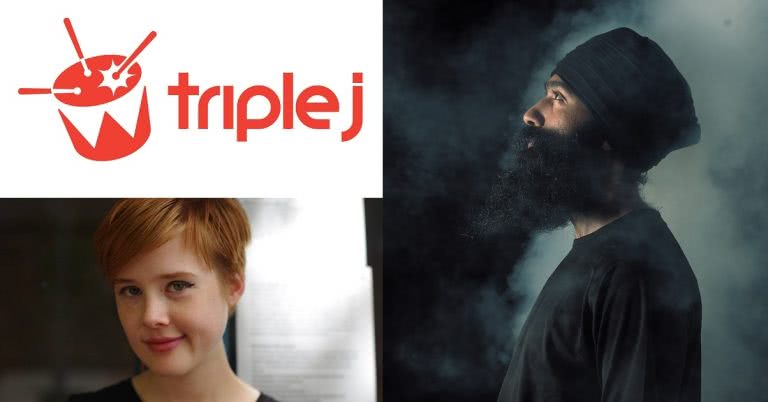Parramatta Park is hosting a Hottest 100 party this Australia Day with live music from L-Fresh The Lion, Olympia, VXV and more.
There is no real reason triple j’s Hottest 100 should matter as much as it does.
It is a glorified user feedback form, one hampered by a series of major restrictions and odd biases (Tay Tay’s disqualification, anyone?) that, unless changed, will always stop it from being a true reflection of the Australian listening public’s taste.
And yet, almost paradoxically, the Hottest 100 matters exactly because we tell ourselves that it matters. We invest so much in the list’s ranking that it comes to define what we expect from both commercial radio itself and the output of Australian bands: songs are often branded ‘Hottest 100-esque’ long before voting is even open.
On the very day it aired people were already suggesting Paul Kelly and A.B. Original’s version of‘Dumb Things’was guaranteed to appear in the Hottest 100.
triple j isn’t just a station, it’s a genre of music, and an exceedingly commercially viable one at that. It is a brand associated with success; a company forged upon a reputation as a tastemaker responsible for building up the careers of a wealth of celebrated Australian talents.
It is for that exact reason that it mattered last year when only five per cent of the list’s top 20 songs were written by female or female-identifying artists. It mattered then and it matters now, because, though the triple j name claims to be a synonym for success, in practical terms it is really only a synonym for white male success. It mattered and it matters because such a problem represents deep-seated issues concerning diversity that blight the entire Australian music industry.
That’s not to say that triple j isn’t working to address the problem, as many Australian artists well know. Rachel Maria Cox, an Australian singer-songwriter who has courted an ample amount of success on triple j’s Unearthed platform, understands the station is attempting to fix the issue in its own way – and, perhaps unfortunately, in its own time.
“I think the triple j staff and presenters are really working hard to promote and celebrate diversity,” Cox says. “That’s something I’ve noticed a lot in the last year or two years.”
And yet this isn’t some minor issue that the station can workshop its way through. Though the onus is on triple j to attempt to solve the problem, it won’t be solved overnight – indeed, won’t be solved at all unless the culture itself can be radically shifted. After all, as Cox points out, separate polling has already proved that sexism and an overall lack of diversity is an inherent issue, not one just blighting the Hottest 100.
“When you look at something likelast year’s listeners’ poll of the top ten albums, you can see that it’s a wider cultural thing,” Cox says. “Triple j listeners and Australians who listen to music in general still have less diverse taste … Historically, music [and] culture and society [have] all been dominated by straight cis white men. To change that status quo you need to actively work for that.”
It is easy to give up then: easy to give up and hard to see much actual change being enacted in the world. Whether or not this year’s Hottest 100 will be truly diverse remains to be seen, but it’s hard to imagine that it will suddenly have become a perfectly balanced, truly representative collection of songs simply in the space of a year.
Yet progress is being made; slowly, in a multitude of small, deeply important ways. Time will tell whether the campaign to push A.B. Original’s titanic and important ‘January 26’ to the top of the countdown – a move designed to draw attention to the problematic nature of the list being unveiled on Australia Day – will succeed.
But regardless, the fact that the song and the campaign has remained such a dogged talking point is important. The fact that the mainstream media has been forced to discuss issues so often ignored – issues relating to representation, and the true meaning of diversity – is a victory, no matter how slight it might outwardly seem.
“Triple j are pushing more diversity both on their airwaves and in the artists they promote,” says Cox. “It’s still not perfect but it’s a start, which means maybe in a few years we’ll see the Hottest 100 catch up to that.”
The message, then, is one of hope. The message concerns changing the world in a host of nigh-on miniscule yet all-important ways. And the message is about making sure that a list so many believe in becomes one that all really can.
“This year I voted exclusively for Australian artists with at least one non-male member,” says Cox. “If you really want to see change you have to act it.”
You can celebrate the unveiling of the Hottest 100 at Parramatta Park on Thursday January 26, with a diverse lineup of live acts including L-Fresh The Lion, Olympia, VXV, Froyo, Kuren, Hurst and MC Jake Stone. Meanwhile, The Crescent will host sets from Eskimo Joe, Thundamentals, Thandi Phoenix and Beatz.


































